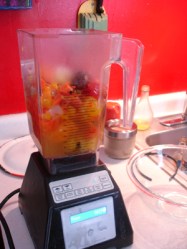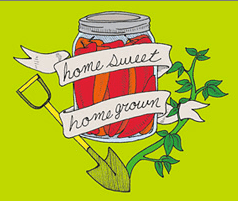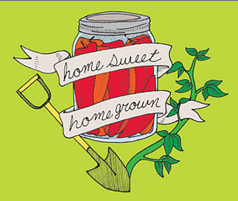Robyn Jasko started her blog Grow Indie as a way to offer a guide to easy, DIY garden and cooking projects. (It’s part of the goindie.com network, which she and her husband created to encourage the support of local, independent businesses.) Now, Jasko has put together a book, inspired by information on her website, called Homesweet Homegrown: How to Grow, Make and Store Food, No Matter Where You Live. A slim paperback sweetly illustrated by Jennifer Biggs’ drawings of vegetables and raised beds, Homesweet Homegrown gives instructions so straightforward they made even this brown-thumbed author feel a little less daunted — excited, even — by the concept of growing some legit food.
The book is neatly divided into chapters titled “Know,” “Start,” “Grow,” “Plant,” “Plan,” “Make,” “Eat,” and “Store,” with growing tips and recipes organized in alphabetical lists of vegetables. It also includes easy-to-decipher charts of seed germination times and companion plants. We caught up with Jasko recently to hear more about the book.
Q. Why did you decide to write Homesweet Homegrown?
A. I’ve always been a gardener, whether I’ve lived in the city, the country, or the ‘burbs. Even on my fire escape in Philadelphia I had a tomato garden. Every year when I garden I have about 20 different books that I use and pull different things from. So I thought, wouldn’t it be great if all that information was in one book? I was also inspired by all the questions I get. So I created what I wished existed. It’s a pocket manual that covers all the basics of growing your own food, with recipes, food storage tips, garden planning, information about GMOs, organics, heirlooms, and more.
Q. How does this book stand out from all the other gardening, cooking, and farm-to-table literature that’s so popular right now?
A. I didn’t want mine to be just another coffee table book. A lot of books have a lot of narrative and fluff. I just wanted to streamline it. I tried to have the book include everything somebody would need to know in 128 pages, so they can take this book out into the garden. It has a very grassroots, DIY feel to it that’s not intimidating. [The author of this article agrees.] And it’s probably cheaper; it’s only 10 bucks.

Robyn Jasko, author of Homesweet Homegrown.
Q. Who’s the intended audience for Homesweet Homegrown?
A. It’s definitely perfect for beginners. But if you are a seasoned gardener, there are charts in there that not everybody has memorized. I included a lot of DIY projects, if you’re resourceful and you want to start making your own irrigation system or seed starter system.
That’s the wonderful thing about gardening: It spans many different demographics. I’ve been getting feedback from people who have nothing in common, but they all love growing food.
Q. Tell me about the cross-country book tour you and illustrator Jennifer Biggs are embarking on.
A. We leave on June 16; we’re going to fly to Seattle and take the train back to Philly. In each city, we’re doing a book signing/garden demo. We’re serving up heirloom cocktails like beet sangria and lemon cucumber martinis.
There’s something so fun about train travel, besides of course reducing our carbon footprint. There’s wifi, you can relax, you can read a book, and the drinks car is one of our favorite spots. It doesn’t get much better. I wish more people took the train. We’re trying to raise awareness about that as well.
Below is a recipe from Homesweet Homegrown:
 Orange Crush Habanero Sauce
Orange Crush Habanero Sauce
Make your own habanero hot sauce without macing your house by using this simple blender trick.
Ingredients:
- 20 whole habaneros (fresh or frozen), destemmed
- 1 cup apple cider vinegar
- 5 carrots, chopped
- 1 onion, chopped
- 4 cloves of garlic
- 1 tsp. olive oil
- water to cover peppers
- smoke paprika
- salt and pepper
- cumin
- 1 lime
To make:
Saute carrot and onion with olive oil. Once the onions are translucent, add a cup of water and then add your peppers. Add more water to just cover the peppers and let simmer for five minutes. Once it’s all softened, transfer (carefully!) to a blender (a Blendtec or Vitamix works great) and blend blend blend.
Then, move back to the stovetop and add apple cider vinegar and lime. Simmer until it thickens (about 10 more minutes).
Put into hot sauce bottles and store in the fridge for up to a month, or freeze extra sauce in Mason jars. Then, get the water ready. This stuff is hot!
See the Homesweet Homegrown tour dates here.





